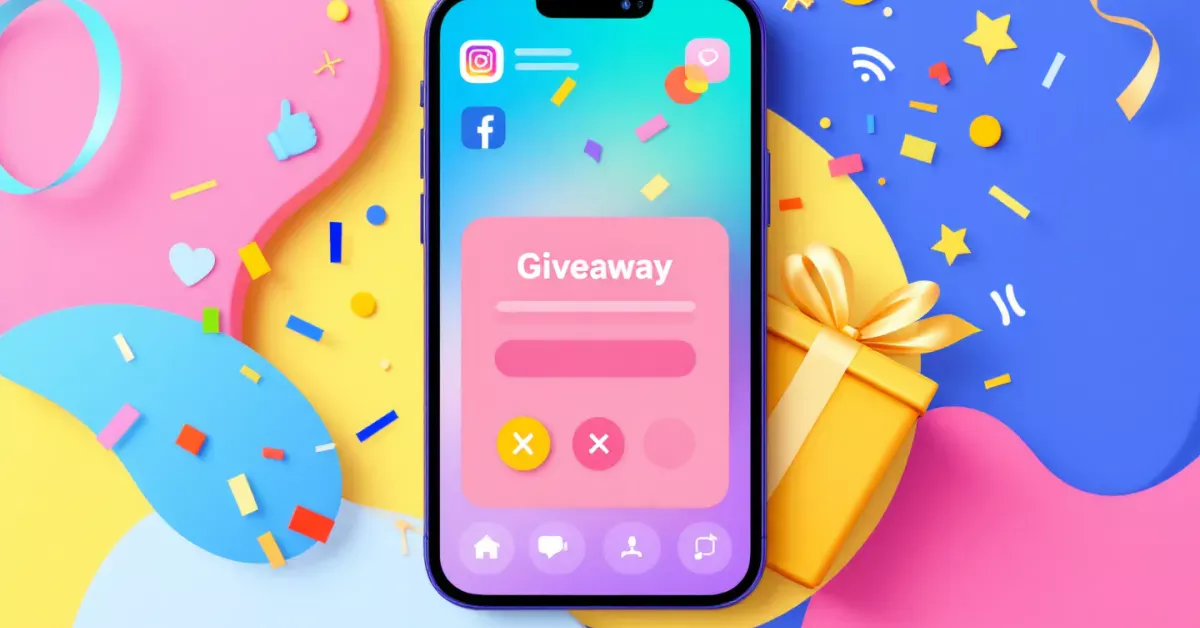Social media contests and giveaways are a brilliant way to boost engagement, grow your audience, and create a buzz around your brand. But let’s be honest—pulling off a contest that actually works takes more than just giving away a prize and hoping for the best. In this guide, you’ll find practical tips for designing and running social media contests that not only get people talking but also help you reach your business goals.

Why Social Media Contests Work
People love the chance to win something, especially if it’s easy to enter. Social media contests tap into this excitement, making your brand more visible and encouraging users to interact with your content. When done right, they can help you:
- Increase brand awareness
- Grow your follower base
- Boost engagement (likes, comments, shares)
- Collect user-generated content
- Drive traffic to your website or landing page
Contests also help you build a community of loyal followers who are more likely to stick around and support your brand in the long run.
Setting Clear Goals for Your Contest
Before you start planning, ask yourself: What do you want to achieve? Your goals will shape every part of your contest, from the platform you choose to the prize you offer.
Some common goals include:
- Getting more followers
- Increasing engagement on a specific post
- Promoting a new product or service
- Collecting email addresses for your newsletter
- Gathering user-generated content for future marketing
Having a clear goal makes it easier to measure your contest’s success and tweak your approach for next time.
Knowing Your Audience
Understanding your audience is key to running a contest that actually gets results. Think about who you want to reach and what kind of prizes or activities would appeal to them. For example, a photo contest on Instagram might work well for a younger crowd, while a LinkedIn giveaway could be better for professionals.
Research your audience’s interests, habits, and preferred platforms. This will help you design a contest that feels relevant and exciting to them.
Choosing the Right Platform
Not all social media platforms are created equal. Each one has its own strengths and user base, so pick the one that matches your goals and audience.
- Instagram: Great for visual content and younger audiences. Perfect for photo or video contests.
- Facebook: Wide reach and versatile content options. Good for detailed posts and sharing.
- X (Twitter): Fast-paced and ideal for quick, viral contests using hashtags.
- TikTok: Excellent for creative video challenges and reaching Gen Z.
- LinkedIn: Best for B2B contests and professional engagement.
Focus your efforts where your audience spends the most time.
Picking the Right Type of Contest
There are plenty of ways to run a contest, but the best ones are simple, fun, and easy to enter. Here are some popular formats:
- Like, comment, and share to enter: Quick and easy, great for boosting engagement.
- Tag a friend: Helps you reach new people through your followers’ networks.
- Photo or video contest: Encourages user-generated content and creativity.
- Caption contest: Fun and interactive, perfect for sparking conversation.
- Hashtag challenge: Expands your reach and makes it easy to track entries.
- Referral contest: Incentivises users to share your contest with their friends.
Choose a format that matches your goals and feels natural for your brand.
Setting Clear Rules and Guidelines
Transparency is everything. Make sure your contest rules are easy to understand and cover all the basics:
- How to enter
- Who can enter (age, location, etc.)
- What the prize is
- Start and end dates
- How the winner will be chosen
- Any legal disclaimers or platform-specific requirements
Clear rules help avoid confusion and keep things fair for everyone. See a sample rules template.
Choosing a Prize That Gets People Excited
The prize is the main attraction, so make it count. It doesn’t have to be expensive, but it should be something your audience actually wants. Ideally, it should also relate to your brand—think products, gift cards, exclusive experiences, or limited-edition items.
Offering a mix of grand and smaller prizes can increase participation and keep more people interested.
Creating a Catchy Hashtag
A unique hashtag makes it easy to track entries and helps your contest stand out. Keep it short, memorable, and relevant to your brand or campaign. Use the hashtag consistently across all your contest posts and promotional materials.
A good hashtag can also encourage sharing and help your contest go viral.
Promoting Your Contest
Even the best contest won’t get far if no one knows about it. Use every channel you have to spread the word:
- Post about the contest on all your social media accounts
- Share it in your email newsletter
- Add a banner or pop-up to your website
- Collaborate with influencers or brand partners
- Use paid ads to reach a wider audience
Eye-catching visuals and clear calls to action will help your contest stand out in busy feeds. Promotion strategies.
Engaging With Participants
Don’t just set and forget your contest—stay active and involved. Like and reply to entries, answer questions, and post regular updates to keep the excitement going. Acknowledge participants’ efforts and encourage them to share their entries with friends.
This kind of interaction builds a sense of community and makes people more likely to join your next contest.
Managing Entries and Preventing Cheating
Keep things fair by monitoring entries for suspicious activity, like fake accounts or duplicate submissions. Use contest management tools (like ShortStack, Rafflecopter, or Gleam) to help track entries, pick winners, and ensure everything runs smoothly.
If you’re choosing winners at random, use a randomiser tool. For contests based on votes or creativity, consider having a panel of judges to make the final call.
Announcing Winners and Wrapping Up
When the contest ends, announce the winner publicly and celebrate their win. Share their entry (with permission) and thank everyone who took part. This not only builds trust but also encourages more people to join your future contests.
Follow up with all participants—send a thank you message or email, and let them know about upcoming promotions or events.
Analysing Results and Learning for Next Time
After your contest wraps up, take a look at the numbers. Track metrics like:
- Number of entries
- New followers gained
- Engagement rates (likes, comments, shares)
- Website traffic
- Quality of user-generated content
Use these insights to figure out what worked and what you could improve for next time. Every contest is a chance to learn and get better.
Advanced Tips for Next-Level Contests
- Leverage user-generated content: Encourage participants to create and share content featuring your brand. This gives you valuable material for future marketing.
- Collaborate with influencers: Partnering with influencers can help you reach new audiences and add credibility to your contest.
- Use storytelling: Ask participants to share stories or experiences related to your brand. This creates a deeper connection and makes your contest more memorable.
- Optimise timing: Launch your contest when your audience is most active—think weekends, holidays, or during major events.
- Encourage multi-platform participation: Let people enter on different platforms to maximise reach.
- Provide real-time updates: Keep participants in the loop with reminders, highlights, and progress updates.
For more advanced strategies, check out this guide.
Common Mistakes to Avoid
- Making the entry process too complicated
- Offering prizes unrelated to your brand
- Not promoting the contest enough
- Ignoring questions or feedback from participants
- Failing to follow up after the contest ends
Keep things simple, relevant, and interactive for the best results.
Final Thoughts
Running a social media contest or giveaway can be a fun and rewarding way to connect with your audience and achieve your marketing goals. With a bit of planning, creativity, and ongoing engagement, you’ll be well on your way to hosting contests that people actually want to join—and talk about long after they’re over.


